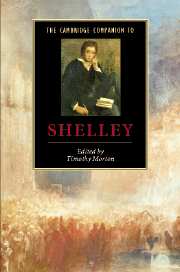4 - The dramatist
from Part II - Works
Published online by Cambridge University Press: 28 January 2007
Summary
Shelley and the theatre
Like Wordsworth or Keats, Shelley has been thought of primarily as a lyric poet rather than as a dramatist. But he was in fact a powerful dramatist who worked with the theatrical conventions of his day in order to remake the stage for the future. We need to pay closer attention to Shelley's attention to drama and theatre. Shelley's engagement with drama was a life-long affair, from a childhood interest in acting to a planned performance of Othello with Shelley as director undertaken by his final circle of friends at Pisa that included Byron and Trelawny, from a play he may have written with his sister Elizabeth at the age of eighteen to the 'Fragment of an Indian Drama', left unfinished at his death, that owed something to the Sanskrit drama Sakuntala. He read widely in the dramatic tradition, familiarizing himself with Athenian drama in the original, translating the Spanish baroque dramatist Calderón, and admiring the Italian pastoral playwright Guarini; he was immersed in the English dramatic tradition, from Sir Walter Scott's three-volume Ancient English Drama (1810) and Charles Lamb's Specimens of English Dramatic Poetry (1808) through Shakespeare, Ben Jonson, and Beaumont and Fletcher, and on to Thomas Otway, John Gay, and William Congreve.
- Type
- Chapter
- Information
- The Cambridge Companion to Shelley , pp. 65 - 84Publisher: Cambridge University PressPrint publication year: 2006
- 1
- Cited by

